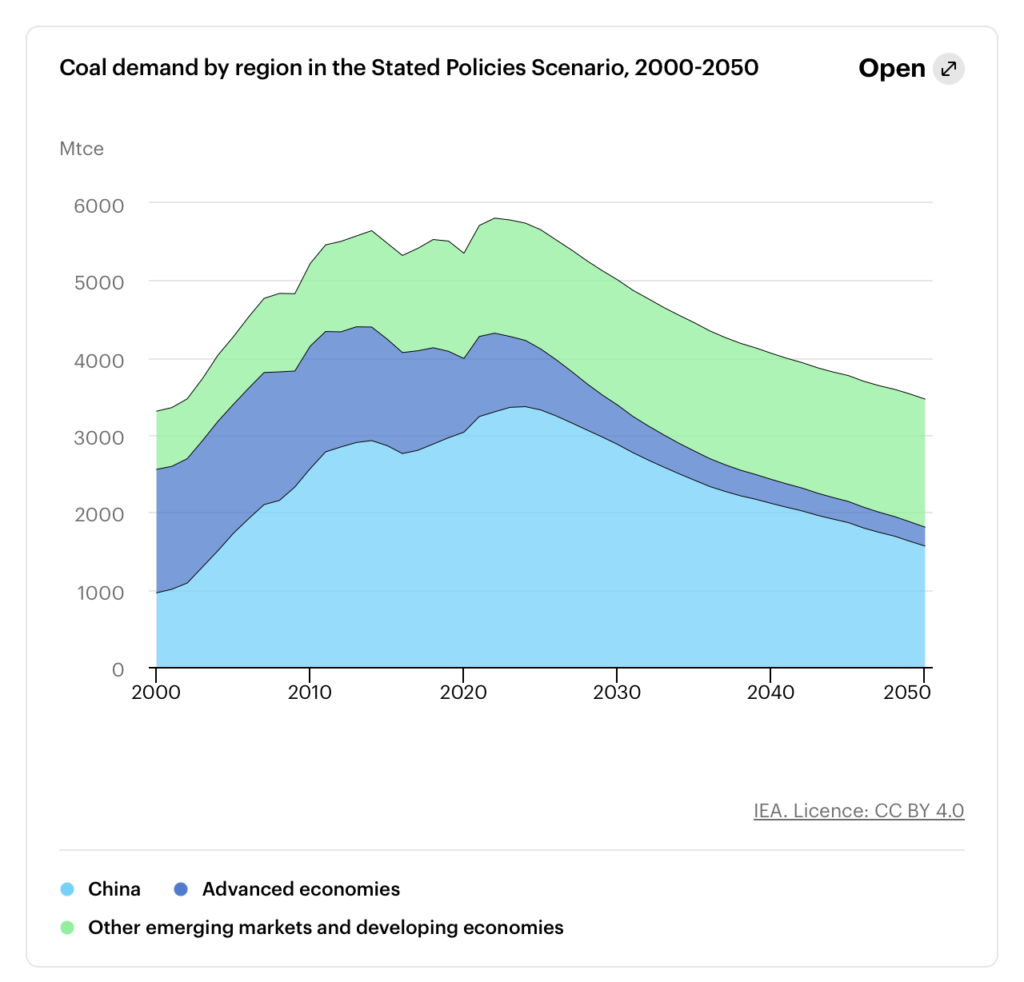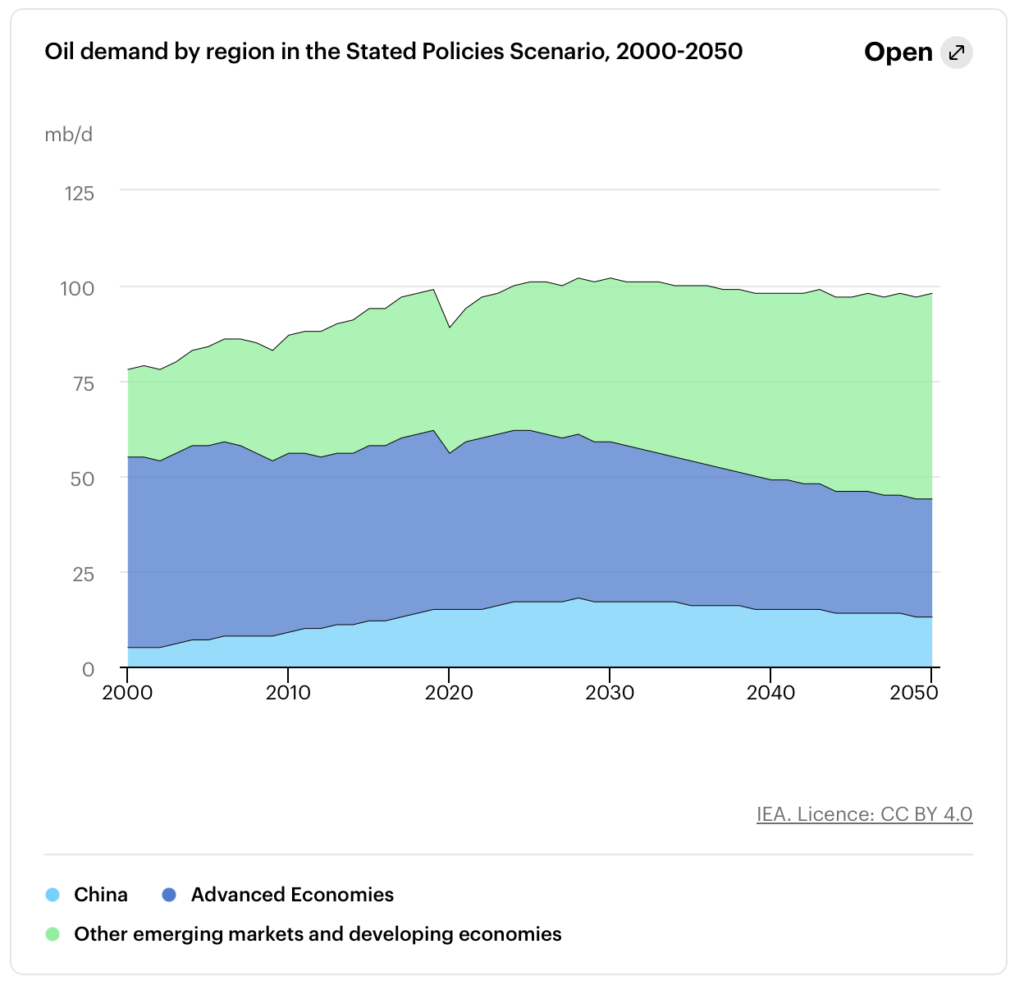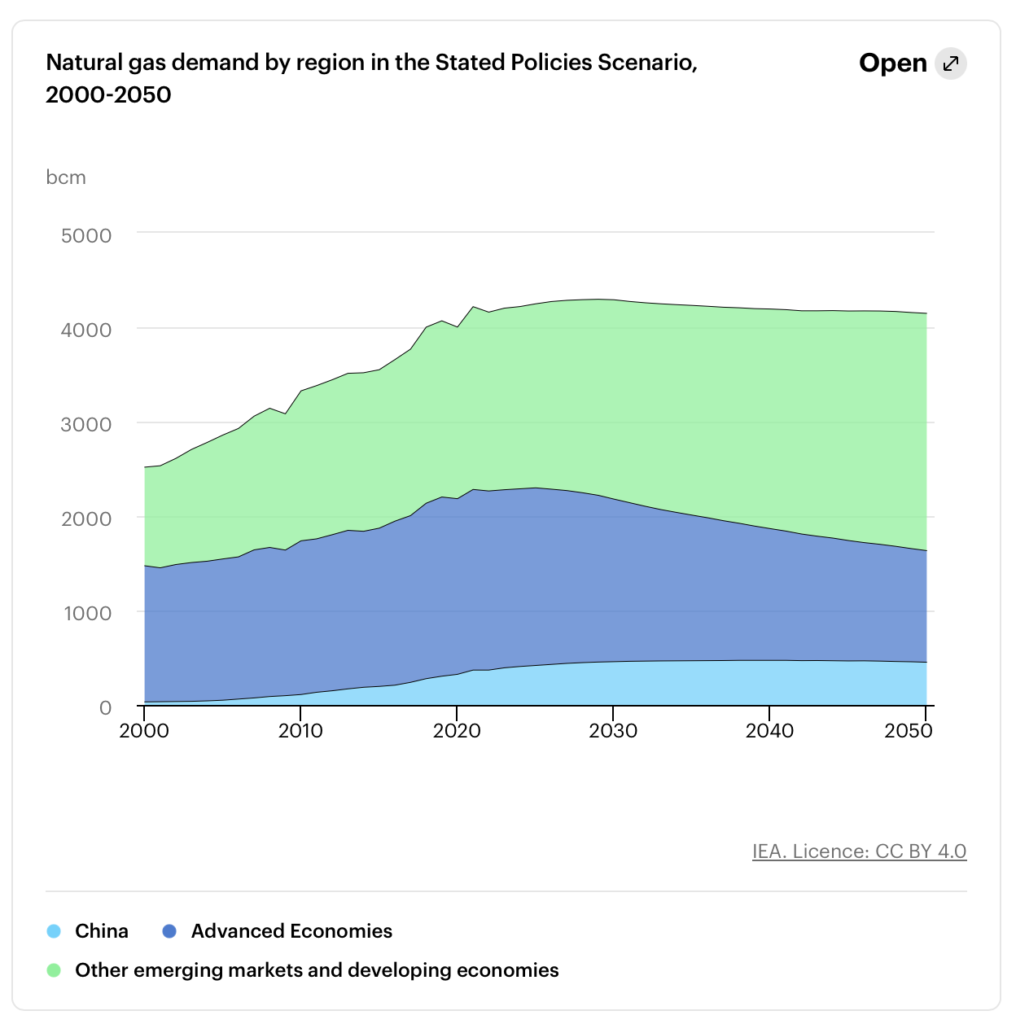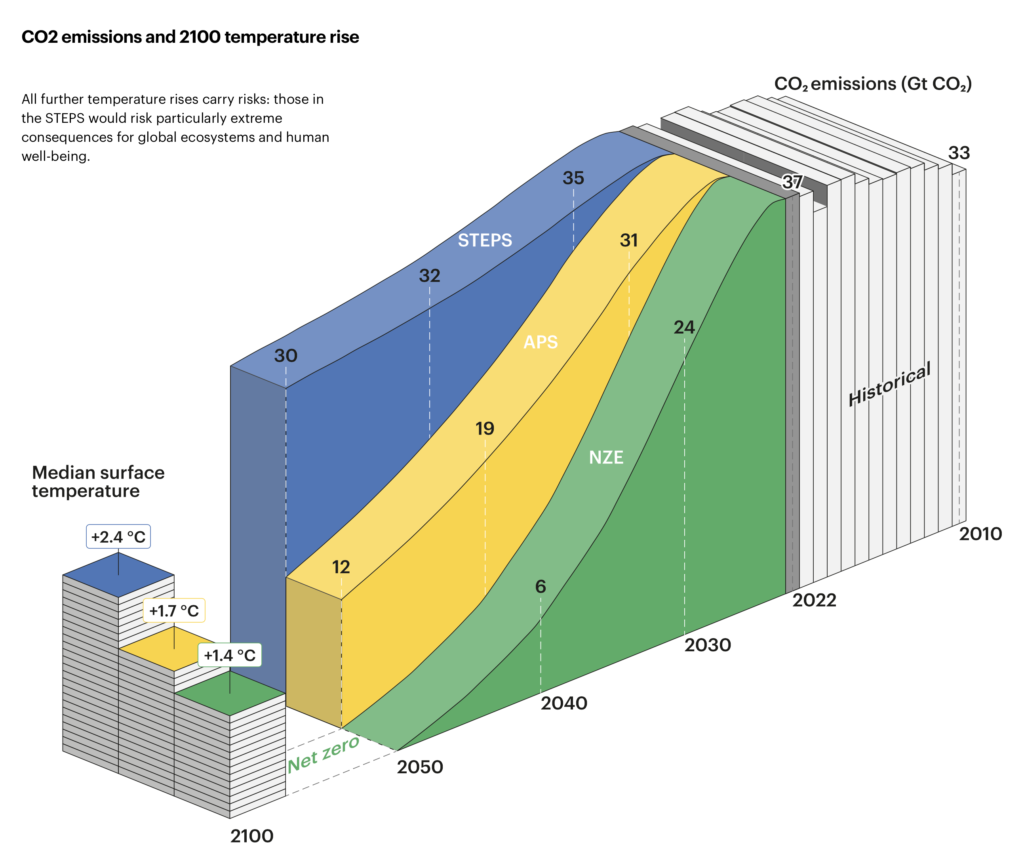The International Energy Agency says peak oil (and coal and natural gas) will likely happen before 2030, not because finite fossil fuels will run out this decade (oil 47 years, gas 90 to 120, coal 132), but because homo energeticus is coming to its senses and switching to renewable energy big time.
IEA’s World Energy Outlook 2023 projects a large decline in the use of coal worldwide. It sees demand for coal and natural gas retreat in advanced economies and level off in China and the rest of the world:



Thanks for the shift go to intensifying development and use of renewable energy:
Policies supporting clean energy are delivering as the projected pace of change picks up in key markets around the world. Thanks largely to the Inflation Reduction Act in the United States, we now project that 50% of new US car registrations will be electric in 2030 in the STEPS. Two years ago, the corresponding figure in the WEO-2021 was 12%. In the European Union in 2030, heat pump installations in the STEPS [Stated Policies Scenario, the status quo] reach two-thirds of the level needed in the NZE Scenario, compared with the one-third projected two years ago. In China, projected additions of solar PV and offshore wind to 2030 are now three-times higher than they were in the WEO-2021. Prospects for nuclear power have also improved in leading markets, with support for lifetime extensions of existing nuclear reactors in countries including Japan, Korea and the United States, as well as for new builds in several more [International Energy Agency, World Energy Outlook 2003: Executive Summary, October 2023].
…China’s transition from booming development to a stable advanced economy:
China has an outsized role in shaping global energy trends; this influence is evolving as its economy slows and its structure adjusts, and as clean energy use grows. Over the past ten years, China accounted for almost two-thirds of the rise in global oil use, nearly one-third of the increase in natural gas, and has been the dominant player in coal markets. But it is widely recognised, including by the country’s leadership, that China’s economy is reaching an inflection point. After a very rapid building out of the country’s physical infrastructure, the scope for further additions is narrowing. The country already has a world-class high-speed rail network; and residential floorspace per capita is now equal to that of Japan, even though GDP per capita is much lower. This saturation points to lower future demand in many energy-intensive sectors like cement and steel. China is also a clean energy powerhouse, accounting for around half of wind and solar additions and well over half of global EV sales in 2022.
Momentum behind China’s economic growth is ebbing and there is greater downside potential for fossil fuel demand if it slows further. In our scenarios, China’s GDP growth averages just under 4% per year to 2030. This results in its total energy demand peaking around the middle of this decade, with robust expansion of clean energy putting overall fossil fuel demand and emissions into decline. If China’s near-term growth were to slow by another percentage point, this would reduce 2030 coal demand by an amount almost equal to the volume currently consumed by the whole of Europe. Oil import volumes would decline by 5% and LNG imports by more than 20%, with major implications for global balances [IEA, Oct 2023].
The IEA says we’re making progress on bending the climate-change curve, but reaching peak fossil fuels under status quo policies and cruising about on more electric Harleys will only reduce carbon dioxide emissions to where they were in 2010, which will cause global temperatures to increase 2.4°C by 2100, which will be bad. Only if we implement further reforms and investments in clean energy can we reach net-zero emissions by 2050 and pull the temperature increase below the +1.5°C level that the IEA says will avert major climate disaster:
Secure energy transitions depend on keeping the global average surface temperature rise below 1.5 °C. The temperature today is around 1.2 °C above pre‑industrial levels, and global emissions have not yet peaked. In the Stated Policies Scenario (STEPS), the temperature rises to 1.9 °C in 2050 and 2.4 °C in 2100. This is 0.1 °C lower than projected in the STEPS from the World Energy Outlook-2022, but far above the levels of the Paris Agreement. In the Announced Pledges Scenario (APS), the temperature rise in 2100 is 1.7 °C; in the Net Zero Emissions by 2050 (NZE) Scenario, the temperature peaks in mid-century and falls to around 1.4 °C in 2100 [IEA, Oct 2023].
Accelerating our transition and global access to clean energy will be good for the economy: current policies alone promise nearly 20% lower household energy bills in advanced economies by 2023. We’ll get 7 million new jobs from the clean energy revolution under status quo policies and 30 million from net-zero policies; either amount, says the IEA, will more than offset job losses on oil rigs, in coal mines, and in other dirty-fuel worksites, although those clean-energy jobs “will often be in new locations and require new skills.”
Global leaders will discuss what they will do to continue our progress in getting off fossil fuels and saving the planet from climate conflagration at the United Nations Climate Change Conference—COP 28—in Dubai November 30 through December 12

We’ve been here before. We’ve seen other fossil fuels use climb and wane. Whale oil. The story of coal is spectacular.
William Stanley Jevons, in 1865, published, The Coal Question: An Inquiry Concerning the Progress of the Nation, and the Probable Exhaustion of Our Coal Mines. Jevons mathematically predicted the UK would hit peak coal in 1913. Coincidentally, 1913 was also the year of peak UK. After 1913 the UK began, and continues its downward global spiral. Losing the UK’s primary energy source contributed to the UK’s slow evaporation. Jevons book is freely available on line.
https://en.wikipedia.org/wiki/The_Coal_Question
Jevons work introduced the Jevons effect or Jevons paradox. “In economics, the Jevons paradox (/ˈdʒɛvənz/; sometimes Jevons effect) occurs when technological progress or government policy increases the efficiency with which a resource is used (reducing the amount necessary for any one use), but the falling cost of use induces increases in demand enough that resource use is increased, rather than reduced. Governments typically assume that efficiency gains will lower resource consumption, ignoring the possibility of the paradox arising.” (citations removed) https://en.wikipedia.org/wiki/Jevons_paradox#:~:text=The%20Jevons%20paradox%20was%20first%20described%20by%20the,steam%20engine%20from%20Thomas%20Newcomen%20%27s%20earlier%20design.
In Norway motor fuel sales dropped 9% year-over-year. Cratering is the correct description
https://electrek.co/2023/10/20/cratering-motor-fuel-sales-in-norway-show-the-death-spiral-that-can-end-oil/#:~:text=Norwegian%20statistics%20agency%20SSB%20released%20its%20latest%20numbers,fuel%20sales%20year-over-year%20for%20the%20month%20of%20September.
Tough to compete with diesel.
Many homes are heated with natural gas and propane. The grid would need huge, huge improvements to handle heating and EV charging.
No way am I relying on the electric company to be 100% reliable in this part of the woods in the winter. I would need fuel based backup. Anyone relying 100% on electric for heating in the winter is an irresposible fool.
Anyone who can afford to leave the grid should do it now.
Leave the grid. Spend $50k on solar panels with propane backup for when one realizes the solar panels don’t put out nearly enough energy to heat the house in January and battery capacity to heat at night isn’t enough, especially when it’s been overcast for thw last week.
This is usually how off the gridders are setup in cold climates. Would be dumb not to have the propane backup.
@SX123 – You have a very sheltered view. Travel would be good for your children. I’ve relied on fully electric heating for over 20 years. Electric homes rarely explode you know. BTW, how do you spell irresponsible again?
Solar is less than $3 a watt and yes, we have radiant floors powered by propane in two of our properties.
@P – my last house was all electric heat, and it’s awesome. Except when the power was out for 3 days.
Ive moved on from spell chck from mobile phnlone. To annoying and nobody kares.
I’ve never had the power go out except during very hot days when Xcel shuts off designated areas for 45 minutes each to reduce risk of brown outs.
But I have knowledge from my youth living in rural areas where it happens. Electric homes there have more exposure to peril.
Just saw an article that Honda is calling of its deal with GM to make affordable EVs because as a business, it’s too difficult.
They better get this problem sorted out or we’ll either quit driving or be on petro for a long time.
I actually like EVs but so many problems to overcome to be in the same league as ICE vehicles.
Our country should have made the commitment to alternate fuels decades ago, but one certain magat party wasn’t interested in upsetting big awl campaign contributors.
It is quite possible many of these glitches could have been worked out years ago.
China’s new limit on battery metals could haunt the global EV boom. USA cut off their access to war making computer chips and they’ve retaliated by cutting off much of our access to raw and synthetic graphite.
Here’s your weekly China insider update:
https://www.axios.com/newsletters/axios-china
Solar modules are a pain and expensive to recycle but it’s happening anyway.
https://grist.org/energy/where-go-solar-panels-when-they-die/
Global Warming is real and a tipping point has been reached when the public in the United States, including large corporations, have decided it is time to get on board renewable energy. whether we will do enough, or whether any thing we do will have an impact on changing weather patterns is up in the air, literally. One way or the other we, that is the global population, will probably go from tipping point to desperation point, before any real headway is made. By then, it will probably be too late.
About 75% of greenhouse gasses are emitted by Transportation (28%), Industry (23%), and, wait for it, Electric Power (25%).
Ag is 10% and Commercial/Residential is 13%. Per epa.gov.
Gonna take a lot of windmills, solar panels, geothermal, and hydro to replace that 25% and more. And it’ll take a lot of raw materials and energy to make those devices.
Better get more nuke plants going. The only realistic way out to an electrified future, imo. Physics.
We have a Speaker of The House, we have a Gearing Up Administrator that Mr. H has blogged about before taking over in Senator Rounds’ office, and we have dead administrators of the Demon Weed, and none of these important topics are being blogged about. Why is only the mainstream media pointing this out? I expect Mr. H to catch up to the Gearing Up Administrator, and revisit his blogging from https://dakotafreepress.com/2021/11/23/americans-for-prosperity-hires-gear-up-scandal-beneficiary-moore-to-lead-crony-capitalist-lobbying-in-sd/ pretty soon.
What we have is a President with a veto pen. What we’ll get is “Four More Years”. Yeah! @ L.A.Knight